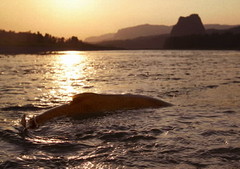forum
library
tutorial
contact

A Strong New Current Behind Columbia Salmon
by Editorial BoardThe Oregonian, March 5, 2009
|
the film forum library tutorial contact |

|
A Strong New Current Behind Columbia Salmon
by Editorial BoardThe Oregonian, March 5, 2009 |
 A historic collaboration of tribes, states and federal agencies gives renewed hope for the future of Northwest salmon
A historic collaboration of tribes, states and federal agencies gives renewed hope for the future of Northwest salmon
When U.S. District Judge James Redden enters his crowded Portland courtroom for Friday's highly anticipated hearing on Columbia River salmon, he will see a powerful symbol of a historic change in the Pacific Northwest.
The Native American tribes of the Columbia Basin, with one exception, will be sitting shoulder to shoulder with the U.S. government agencies that manage the river basin, its dams and its fish and wildlife.
This is more, much more, than a new seating arrangement. For the first time in the long, litigious history of Columbia Basin salmon recovery, most of the groups that have spent 25 years locked in one dam fight after another have lined up together behind the same federal plan to operate dams and restore fish.
Redden understands all that it means for six tribes, three states and dozens of interest groups ranging from ports to public utilities to stand together behind the federal government's biological opinion. This, after all, is Redden's doing. He's pushed, pushed, pushed the many parties to come together after years of litigation to collaborate on a strategy to save fish.
And the plan most have now rallied around is by far the best, most promising commitment the government has made to improve dam passage, restore habitat, strengthen hatcheries and restore 13 threatened species of salmon and steelhead.
In their legal filings, the Warm Springs, Yakama and Umatilla tribes wrote, "We have never had this sort of opportunity to act for the salmon, and (we) believe we must seize the moment. We finally have a practical and comprehensive federal salmon plan. It may not be perfect, but it's a plan based on the best available science."
Is it enough? Will it truly offset the harm to fish from the dams and lead to recovery of the Northwest salmon runs? The environmental plaintiffs, the Nez Perce tribe and Oregon, the only Northwest state that doesn't endorse the plan, want more.
The environmental groups seek the breaching of four Snake River dams. Oregon wants more water spilled over dams to help young fish get safely downriver. Yes, these measures might raise the likelihood, and the pace, of salmon recovery. But the costs would be enormous. Already, Northwest ratepayers and federal taxpayers spend $700 million to $800 million a year on fish in the Columbia Basin. The new federal plan commits more than a billion additional dollars over a 10-year period.
Oregon's demand for more spill would further jack up electric rates -- and require more greenhouse-gas emitting replacements for the clean power forgone by running water over dams. Gov. Ted Kulongoski has never reconciled his state's position on Columbia hydropower with his laudable goals on greenhouse gas emissions.
Judge Redden is prodding the feds to strengthen commitments to improve fish habitat in the Columbia estuary. He's pressing for more spring spill, although some research suggests there are other, better ways to help chinook and steelhead. Redden also has hinted that he thinks dam breaching should be further studied as a contingency in the event the federal plan fails.
The judge's instinct to try to strengthen the plan must be carefully balanced against the risk of breaking the still young and fragile consensus on salmon recovery. Research will reveal new things about the fish this year, next year, every year. What matters most is not setting an exact level of spill today, but making permanent a collaborative, effective way to respond to new information and new challenges on the river tomorrow.
The legacy of this historic salmon case will not be found in the fine print of the federal plan. The real and lasting legacy will be all those former adversaries in the long Northwest fish wars who have finally come together to save Columbia salmon.
learn more on topics covered in the film
see the video
read the script
learn the songs
discussion forum
